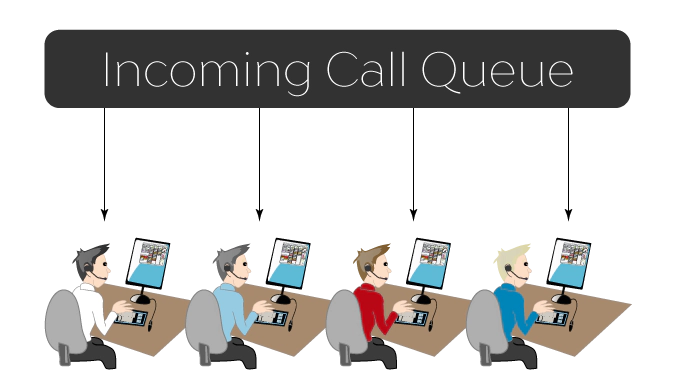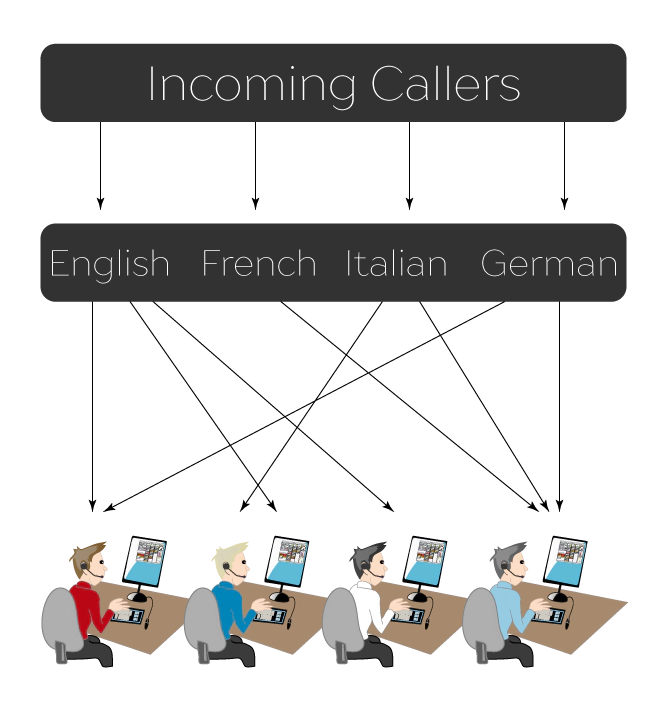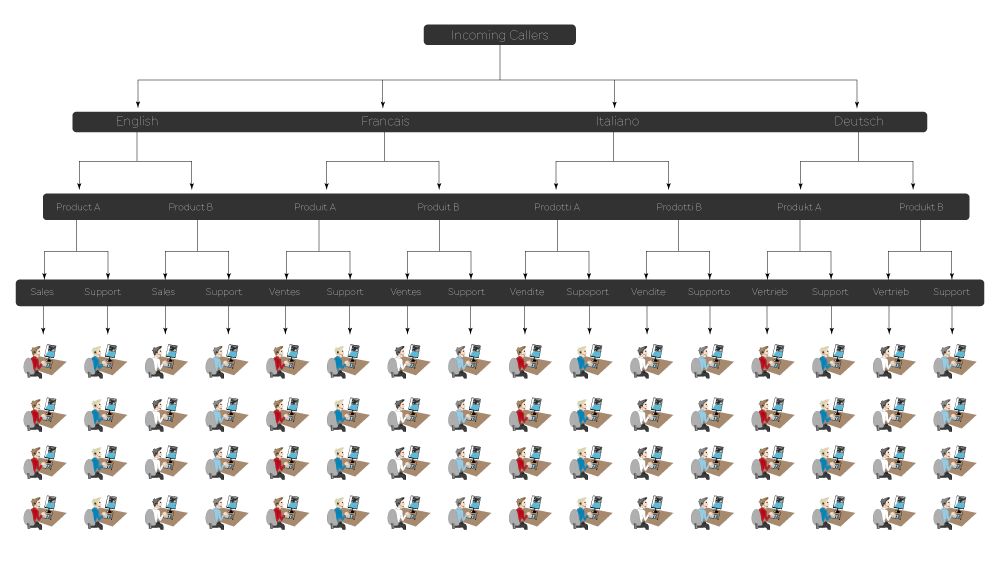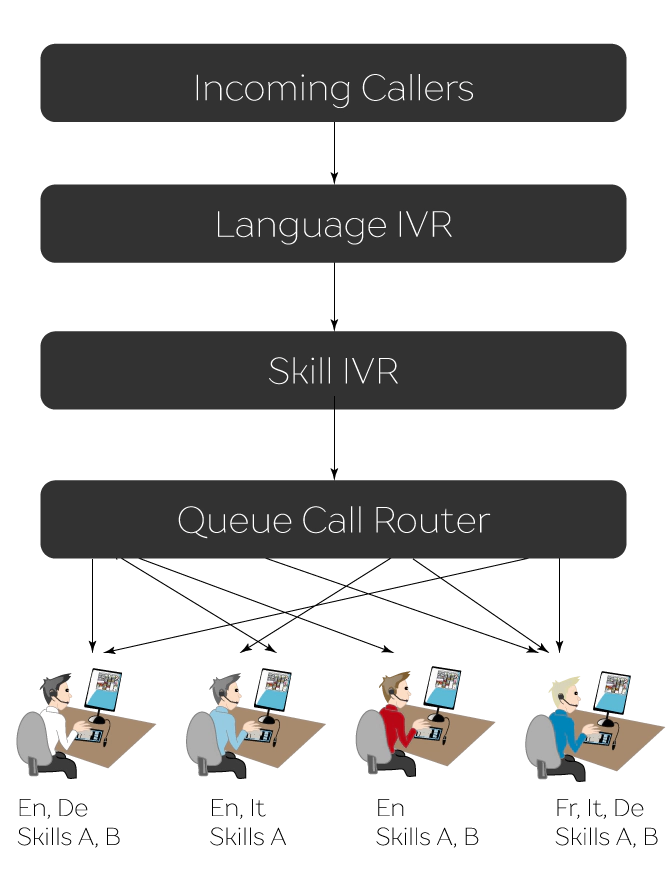What is Skills-Based Routing
The majority of modern businesses will operate at least some form of Contact Center as part of their business operations. Moreover, every employee who works within your Contact Center will likely have a varying skill set and could quite possibly work in more than one team.
The simplest scenario can be best illustrated by language skills. Imagine a Contact Center in a country, such as Switzerland, The Netherlands, Hong Kong, the USA or any Middle Eastern country where more than one language is widely spoken. This company will need to have the ability to route calls based on the caller’s language. Now, of course, this doesn’t just apply to call centres that predominately operate nationally. International companies also require the ability to make sure their customers speak to the right person, the first time and every time.
However, the possibilities presented by skills-based routing are not just limited to languages, but also different departments, brands, products etc and this begs the question: “how can businesses best utilise their Contact Center resources and skill sets?” - and that is where the Next Generation Contact Center (NGCC) comes into its own.
We can all remember an occasion, or more likely multiple occasions, where we have called a company or organisation and have been subjected to the merry-go-round of transfers as our initial contact person endeavours to find someone who can actually help us.
These types of experiences were indicative of early day Call and Contact Centers which employed a straightforward, no none sense approach to call distribution. In a conventional Contact Center, the traditional setup was one where you would have one queue, log your agents in and the next available agent would answer the call in a process fairly similar to the diagram below.
 Traditional Call and Contact Centre Call Distribution
Traditional Call and Contact Centre Call Distribution
Precursors to Skills-Based Routing
However, over time things have changed. Technology has become more advanced and more intelligent, allowing for better, more efficient call distribution. A good example of this is with previously premium rate features. As they became more affordable and cost-effective, the option of implementing previously inaccessible tools such as Interactive Voice Response (IVR) menus started to pave the way for the early days of skill-based routing.
Thanks to the IVR, it was now possible to qualify the callers language (or whatever the defining skill need be) straight away allowing the call to be routed to agents with those particular skills thanks to Automatic Call Distribution (ACD). An even better option, at least as languages are concerned, was having the ability to identify the international country code. This is because except a few already mention exceptions, the country code is synonymous with the caller’s language. Either of these techniques would have resulted in a call distribution pattern that was vaguely skills-based and would look similar to:
 Skills-based Routing
Skills-based Routing
Through using IVR menus, it is also possible to further qualify which skills your caller is looking for. For example, the second menu level could include a series of options to define which department or product or brand etc. that the caller is interested in and then route the call to employees with the relevant knowledge/skill set. As the incoming calls are being routed to a team of agents with the relevant skills, this could be considered the precursor to skill-based routing at its most basic.
However, there are a couple of significant problems here. Firstly, using this option, particularly if your company requires multiple skills to be fulfilled, you will likely have numerous teams. This will make maintaining a good overview and conducting statistical analysis of your Contact Centers’ performance particularly challenging at best and a complete mess at worst. A great example of this would be any Contact Center based in Switzerland which has four main languages. If add two product lines and two departments per product to the mix, then you are already looking at 16 teams/queues which like the image below illustrates, can make it very difficult to maintain a good overview and imagine how difficult it would be with even more skills.
 IVR / Auto Attendant Routing
IVR / Auto Attendant Routing
Then there is the second problem. Your callers are still not being routed to the Contact Center agent with the corresponding skill set to best suit their needs as there has been no definition of the agent’s skill set itself. In the case above, they either have them or they don’t and there is nothing in between. For example, if you have an agent who can speak 2 or 3 languages proficiently enough to offer either sales or support to those customers, in the model above if you wish to be able to utilise their skills they would need to be logged into to more than one queue at a time which would make call routing more complicated and performance reviews pretty tricky as there could well be 12 sets of statistical data for this one agent.
Next Generation Skill-Based Routing
In a nutshell what a next-generation skill-based routing solution actually does is similar to the solution above. However, next-generation skill-based routing differs in that it goes a few steps further and takes the information from the IVR and then matches it to the individual skills of your Contact Center agents and routes your incoming calls accordingly. Basically, every Contact Center agent will have a skill matrix which can be compiled and quantified using a combination of existing skills, knowledge as well as training and experience. Moreover, their individual skill matrices can be continuously reviewed and adjusted accordingly.
As skill priorities are assigned to not only the agent’s skill set but also as minimum requirements to the incoming calls as a “label” (brand, product, department, etc), skill-based routing also delivers the additional benefit of being able to react to changes in demand cycles much more quickly and more efficiently. This, in turn, will enable you to drive your Contact Center performance to the next level and support you really improve customer satisfaction, which at the end of the day is pretty much what every business should be aiming to achieve.
Imagine for a moment that you have two brands (A and B) and a group of agents who work on both brands as illustrated in the image below. Chances are that one agent will be better qualified, more experienced etc to work on Brand A, while another agent will be better suited to work on Brand B.
 Next Generation Skills-Based Routing
Next Generation Skills-Based Routing
By applying and quantifying a skill set, you can take Skill-Based Routing even further. In doing so, you can ensure that your customers only speak to the most qualified agents during periods of normal call volume.
Should call volumes spike, however, you can use priorities and call labels to adjust the thresholds required to fulfil an incoming callers request and match it to an available agent. For example, should demand for brand B increases dramatically and all the more qualified agents are busy. This will result in a backlog of callers waiting in the queue.
By using call labels and assigning priorities, it is then possible to lower the skill priority level assigned to the brand and the calls will be routed to more agents. In turn, this will ensure lower waiting times and will alleviate workloads, thus ensuring high levels of customer service.
Yes, it can be argued that the other agents aren’t as qualified, but the chances are as they work on both brands they will be able to answer the majority of questions or resolve the vast majority of problems.
If you are considering switching or upgrading your telephony services to include ContactCentre functionality and Skills-Based Routing or would like more information regarding pascom, then give the pascom team a call on +49 991 29691 0 to discuss your requirements and get started within minutes using our free hosted business VoIP phone system edition.